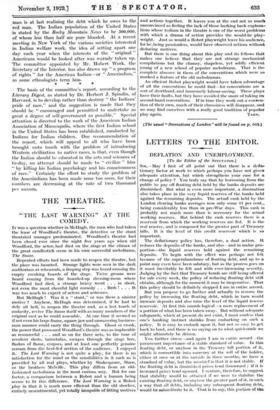THE THEATRE.
"THE LAST WARNING" AT THE COMEDY.
IT was a question whether in McHugh, the man who had taken the lease of Woodford's theatre, the detective or the stunt theatrical manager predominated. Woodford's theatre had been closed ever since the night five years ago when old Woo.dford, the actor, had died on the.stage at the climax of the great candlestick scene in his own successful melodrama, The Snare.
Repeated efforts had been made to reopen the theatre, but the place was haunted. Strange lights were seen in the dark auditorium at rehearsals, a limping step was heard crossing the empty creaking boards of the stage. Twice groans were heard coming from the boarded-up dressing-room where Woodford had died, a strange heavy scent . . . in short, not even the most cheerful light comedy . . . Brrh ! . . . It was too much to expect of actors and actresses.
But McHugh ! Was it a "stunt," or was there a sinister motive ? Anyhow, McHugh was determined, if he had to defy all hell, to reopen the theatre and, as a last touch of audacity, revive The Snare itself with as many members of the original cast as he could assemble. At one time it seemed as if not even his large frame, square jaw and unwavering business- man manner could carry the thing through. Ghost or crook, the power that possessed Woodford's theatre was as implacable as resourceful . . . and so on for three acts, to the tune of revolver shots, tarantulas, escapes through the stage box, flashes of flame, corpses, and at least one perfectly genuine scream from the best-fed section of the audience. I enjoyed it. The Last Warning is not quite a play, for there is no satisfaction for the mind or the sensibilities in it such as is provided by all real plays, whether by Shakespeare, Shaw, or the brothers Melville. This play differs from an old- fashioned melodrama in the most curious way. But for one factor, a comparison between a Robot and a human being seems to fit this difference. The Last Warning is a Robot play in that it is much more efficient than the old shocker, entirely unsentimental, ret-totally incapable of fitting motives
and actions together. It leaves you at the end not so much unconvinced as feeling the lack of those harking back explana- tions whose tedium in the theatre is one of the worst problems with which a drama of action provides the would-be play- wright. Just so would a Robot playwright leave his audience, for he, being passionless, would have observed actions without deducing motives.
But there is one thing about this play and its fellows that makes one believe that they are not strange mechanical compilations but the clumsy, shapeless, yet oddly efficient young of a new school of popular melodrama. That is the complete absence in them of the conventions which were so marked a feature of the old melodramas.
An efficient Robot playwright would have taken advantage of all the conventions he could find—for conventions are a sort of shorthand, and immensely labour-saving. These plays have their faults, but they have avoided the snare of taking on second-hand conventions. If in time they work out a conven- tion of their own, much of their clumsiness will disappear, and we may find ourselves with a really good tradition of popular


























































 Previous page
Previous page